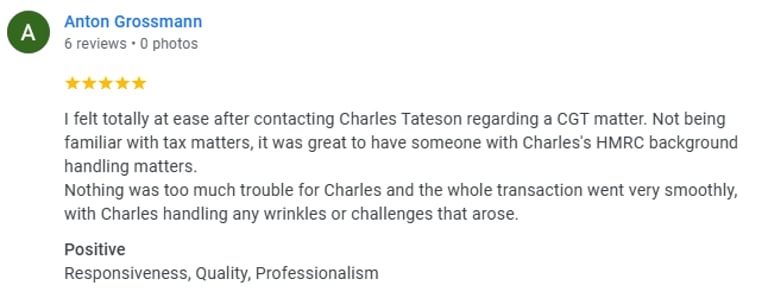Understanding Capital Gains Tax on Property Sales in the UK


We can solve your tax problems, with ex-senior expert HMRC inspectors here to help to take the stress away from your tax worries.
We do everything for you, including filing returns and giving advice that may help to reduce the amount of tax that you owe.
Our guarantee to you - You will pay the lowest amount of tax possible, while complying with the law.
(Non-UK callers may need to call +44 207 101 3845 if you cannot connect to our 0800 number)
Call: 0800 0016 878 - Email: info@thetaxfaculty.co.uk


Capital Gains Tax on Property
What you need to know
What is Capital Gains Tax?
Capital Gains Tax (CGT) is a tax on the profit made when you sell or dispose of an asset that has increased in value. This can include property, stocks and shares, and personal possessions worth over £3,000.
In the UK, property is subject to CGT, but the rules and rates can be quite complex. If you are thinking of selling a property, it is important to understand how CGT applies to you.
Who Needs to Pay CGT on Property?
If you own a property that is not your main residence, and you sell it for a profit, you may need to pay CGT. This includes the sale of:
Buy-to-let properties,
Second homes,
Inherited properties that you do not live in,
Properties that you have lived in, but only for part of the time you owned them, or
Commercial properties, such as shops or factories.
If you sell your main residence, you will usually not have to pay CGT, as long as it has been your main residence throughout the period of ownership. There are some exceptions to this rule, such as if you have used part of the property for business purposes.
How is CGT Calculated on Property?
The amount of CGT you will need to pay on the sale of a property will depend on a number of factors, including:
The amount you bought the property for,
The amount you sold the property for,
Any costs associated with buying or selling the property, such as estate agent fees or solicitors' fees, and
Any improvements you have made to the property during the period of ownership.
The rate of Capital Gains Tax for residential property in the UK is currently 18% at the basic rate and 24% at the higher rate.
The rate of Capital Gains Tax for commercial property and other assets that are not residential property are currently 18% at the basic rate and 24% at the higher rate.
The amount of CGT that is paid at the basic rate will also be dependant on a number of factors and it is a common mistake to think that a basic rate taxpayer will pay CGT at the basic rate on all capital gains. See our example to find out more.
There are also a number of exemptions and allowances that can reduce the amount of CGT that is payable.
For example, if you have lived in the property for a time during your period of ownership, you may be entitled to Principle Private Residence ("PPR") relief when you sell the property.
In most cases, you will also be eligible for a tax-free allowance of £3,000 (or £6,000 for the 2023/24 tax year) per person per year, called the Annual Exempt Amount ("AEA"), which means that if your gains fall below this amount, you may not need to pay any CGT.
How Can We Help?
At The Tax Faculty LLP, we understand that CGT can be confusing and complex, especially when it comes to property. That's why we are here to help. Our team of experts can provide you with tailored advice and guidance on all aspects of CGT, including how to minimise your liability and take advantage of any exemptions or allowances that may apply to your situation.
If you are thinking of selling a property and want to make sure you are not paying more CGT than you need to, contact us today for a free consultation. We can help you navigate the complexities of CGT and ensure that once the property has sold that all filing is completed within the 60-day time limit.
If you require assistance with the CGT consequences of the sale of a property, please feel free to contact us on info@thetaxfaculty.co.uk or call us free on 0800 0016 878 for a free initial consultation.
Our Contact Us page has more options for you to get in touch.
CGT Rates Example:
Let's consider Mrs. A who has capital gains of £67,000 on the sale of a UK residential property. After deducting the £3,000 annual exemption, this gives Mrs. A a capital gain of £64,000.
Mrs A earns £35,000 before tax during the year of sale of the property and there are no other factors which affect her tax position.
To calculate the basic rate band which Mrs A has remaining, we take the £35,000 earnings from the £50,270 basic rate band limit, leaving £15,270.
Mrs A is then charged to CGT as follows on the taxable amount of £64,000:
Basic Rate CGT: £15,270 x 18% = £2,748.60
Higher Rate calculation: £64,000 - £15,270 = £48,730
Higher Rate CGT: £48,730 x 24% = £11,695.20
Total CGT: £2,748.60 + £11,695.20 = £16,393
Mrs A has a CGT liability of £14,443.80.
Please remember that this example is for illustrative purposes only and that in a real scenario there would likely be other factors to consider.
Reporting Requirements
When an asset is sold and there is a capital gain, there is a potential that there is a requirement to report this capital gain to HMRC.
UK Residential Property
If you sold a UK residential property on or after 6 April 2020, then you must report and pay any CGT due on UK residential property within:
60 days of selling the property if the completion date was on or after 27 October 2021,
30 days of selling the property if the completion date was between 6 April 2020 and 26 October 2021.
If you are a non-UK resident, then this reporting requirement is true even if there is no CGT liability as a result of the sale of UK residential property.
Other Assets
If your capital gain is not from a residential property sold after 6 April 2020, you can report your gain:
in a Self Assessment tax return, or
using the ‘real time’ Capital Gains Tax Service.
The deadline for reporting such capital gains is the usual Self-Assessment filing deadline, being 31st January following the tax year of the disposal for online returns.
Our Services
We have extensive experience in reducing the Capital Gains Tax due on the sale of UK property and land for non-UK residents.
When you come to sell an asset that was inherited or received as a gift, there may be complex Capital Gains Tax issues to consider.
When assets are split or sold as the result of separation or divorce, there are specific Capital Gains Tax rules that must be considered.
If you give an asset to a family member or friend, there may be Capital Gains Tax consequences. See how we can help you in such a situation.
When selling an asset, there are a number of reliefs available which may reduce, exempt or delay the Capital Gains Tax due.
With HMRC changing the rules on reporting and paying Capital Gains Tax on residential property, we can help you to get things right.
"Tax doesn't have to be taxing" - but it often is. We can help to solve even the most complex issues.
Over the last few years, HMRC have changed the rules for reporting Capital Gains and the Capital Gains Tax due as a result of the disposal of residential properties.
Now you must file a Capital Gains Tax Return to HMRC within 60 days of the disposal of the asset, whereas before you would have been able to wait until it was time to file a Self Assessment Tax Return for the tax year in which the disposal was made.
Should you fail to report the disposal to HMRC and pay the Capital Gains Tax due as a result of the disposal within the new 60 day time limit, you may face a financial penalty.
HMRC's own website states that:
"If you sold your property after 6 April 2020 you must report and pay Capital Gains Tax within 60 days of selling property in the UK.
You may have to pay interest and a penalty if you do not report gains on property within the time limit."
Here at The Tax Faculty, our experts are here to help to ensure that you are in a position to report the correct Capital Gain to HMRC and pay the Capital Gains Tax due at the appropriate time.
We offer a full Capital Gains Tax service which includes our full consideration of the reliefs available to reduce the potential Capital Gains Tax to the minimum level possible, while remaining within the letter of the law governing such disposals. We then take away the stress by filing the online Capital Gains Tax Return on your behalf.
This isn't limited to property transactions either, we also provide a full Capital Gains Tax service on the disposal of shares and other assets.
We have a proven history of reducing the final Capital Gains Tax due for our clients by considering all relevant facts and information provided to ensure that we are in a position to accurately advise on the most cost effective way of reporting the Capital Gain to HMRC.
Contact us today on freephone 0800 0016 878 or info@thetaxfaculty.co.uk to discuss how our experts can help you with any issues relating to Capital Gains Tax.
Please note, non-UK callers may need to call 0207 101 3845 if your line cannot connect to our 0800 number.


Our Promise - Computations in 24 Hours
The Tax Faculty 24 Hour Guarantee
We know that any tax issues are worrying for our clients, that's why we guarantee to provide you with an initial Capital Gains Computation within 24 hours of your providing us with the information that we require.
In addition, we use all our experience and expertise to ensure that you pay as little tax as possible, all while staying within the boundaries of tax law.
Our Managing Partner worked as a Senior Tax Professional within the Capital Gains Tax team in HMRC, giving us an unparalleled level of experience to help our clients reduce their tax bills when they sell property or shares.
HMRC require all disposals of residential property to be reported within 60 days of the sale, so don't delay - call our experts today on 0800 0016 878 or email us at info@thetaxfaculty.co.uk


Contact Us
Contact us today on freephone 0800 0016 878 for a free consultation on all Capital Gains Tax issues, or fill out the handy form below and we'll get back to you as soon as possible.
Alternatively, you can email us at info@thetaxfaculty.co.uk or complete the handy form below.
(Please note, non-UK callers may need to call 0207 101 3845 if your line cannot connect to our 0800 number)
Feel free to contact us through WhatsApp - we accept calls and messages.
Simply click the WhatsApp button below:






















